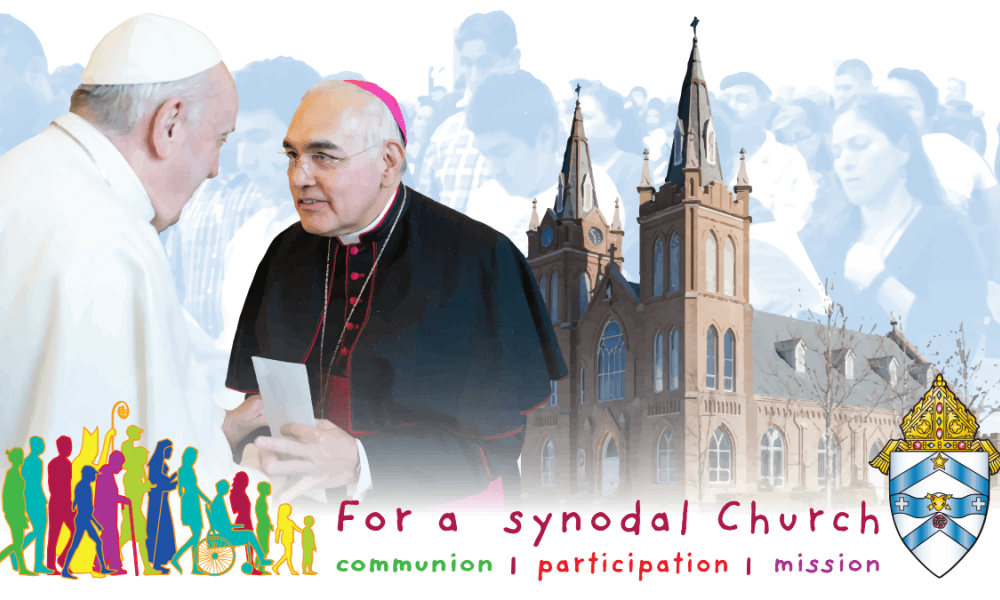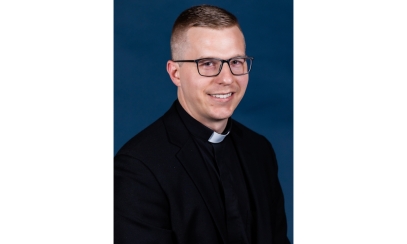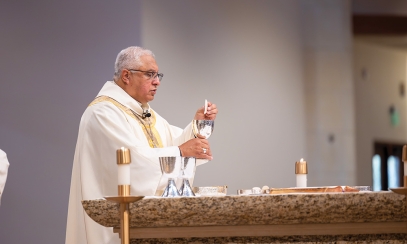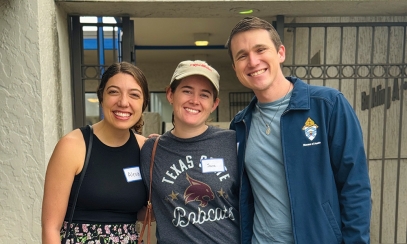
Synthesizing the Synod
Synod Process: an Opportunity to Reflect on Evangelization, Discipleship
Synod Process: an Opportunity to Reflect on Evangelization, Discipleship
Last year, Pope Francis announced the 16th Ordinary General Assembly of the Synod of Bishops. The Holy Father’s aim with this synod has been to involve the whole church at local, national and continental levels through a process of “listening and discernment” on the important theme of synodality: “For a synodal Church: communion, participation, and mission.”
Beginning the process
In October, as Pope Francis formally opened the synod in the Vatican, Bishop Joe Vásquez of Austin formally opened the synodal process with a Eucharistic celebration at St. Mary Cathedral. The synodal path was launched throughout our diocese with parish gatherings between December and February, coupled with five regional meetings with Bishop Vásquez in February.
The objective of the diocesan phase was “to consult the people of God, so that the synodal process may be carried out by listening to all the baptized,” who, as the Second Vatican Council said, “cannot err in matters of belief.”
Therefore, each parish was invited to host sessions with the Christian faithful that included prayer, reflection and sharing prompted by the fundamental question of the synod, “A synodal Church, in announcing the Gospel, ‘journeys together:’ How is this ‘journeying together’ happening today in your particular church? What steps does the Spirit invite us to take in order to grow in our ‘journeying together?’” The goal of the parish sessions and the regional sessions was to express how synodality should be articulated in every dimension of the church.
Feedback from participants
Many participants documented the vibrancy of the sharing during the parish and regional gatherings. Guided by the Holy Spirit, the sharing allowed people to appreciate that they were not isolated in their perspectives and experiences. The synthesis of one of our rural parishes revealed, “The Holy Spirit also revealed to us that we are not alone in our struggles and gave us the opportunity to become more courageous.” One of the campus ministry centers in our diocese expressed, “Getting to listen to each other and share our ideas with such receptivity is a gift, and a desire to continue the discussion was agreed upon.”
Doubts expressed
Some expressed disappointment and frustration that more of the Christian faithful did not engage in the various consultation sessions. Some implored the bishop to encourage pastors to continue the consultation process in the local church in order to get more input.
At more than one of the consultation meetings, some people explicitly stated their doubts that the synodal process would accomplish anything relevant for the local or universal church. People conveyed their beliefs that the church must become much firmer in articulating more clearly Catholic teaching. Some parishes stated the bishops should take a definitive stand against giving communion to people who support abortion, with one person asking, “How can I be courageous if the bishops won’t take the lead here?”
Another concern voiced by some was about the use of the Roman Liturgy prior to the reform of 1970, and more traditional postures and gestures associated with popular piety. Concerns about “the Latin Mass” have been expressed through correspondence received by senior diocesan officials. Many have expressed that regardless of whether it is the Roman Liturgy prior to the reform of 1970 or the new order of the Mass, all liturgies should be celebrated well and reverently.
As widespread participation was an important part of the diocesan process, particularly in view of the diversity of the church in Central Texas, peoples of every demographic – culture, race, age, ideology, and station in life – were called to participate in this synodal process. Syntheses revealed that the Christian faithful are concerned about the marginalized. Numerous parishes disclosed the need to be more hospitable and welcoming to the marginalized, the unchurched and those who are not in regular practice of the faith.
Effects of Covid
People explained that the enduring effects of the coronavirus pandemic has been stressful. Regardless of socioeconomic status and ethnicity, the pandemic has positively and negatively affected faith communities. The feeling of decreased fellowship opportunities, the utter joy of returning to Mass after the restrictions imposed by secular officials gave rise to a renewed desire of encounter, welcome and hospitality. Across the board, feelings of unity in diversity were expressed.
What marvels were wrought as a result of the synodal process in our diocese! While initially there was a mixture of joy, hope, concern, fear and apprehension about the synodal process, the voices of the Christian faithful throughout Central Texas overall expressed immeasurable gratitude, concern and hope as a result of this journey. Many people appreciated the opportunity to have been asked by the church of their thoughts about their lived experiences of the faith, with some conveying that they had “never been asked by the church what we thought.”
What’s next
As we conclude the diocesan phase of the synodal journey, we praise God in thanksgiving for this opportunity to reflect on the work of evangelization and discipleship. We hope these opportunities of journeying together, encountering and accompanying each other, listening and sharing will impel us to bring throughout Central Texas and the world the incontrovertible truth of Jesus Christ and the Gospel.
Currently, we are finalizing the diocesan synthesis that reflects the fruits of the listening and discernment of the people of God in Central Texas. The synthesis will be made available via the diocesan website (austindiocese.org) by the middle of May. The synthesis will be sent to the U.S. Conference of Catholic Bishops. Our synthesis will contribute to the submission to be prepared by the Bishops of North America (the U.S. and Canada), which in turn will form part of the discussion at the Synodal Assembly for the 16th Ordinary General Synod of Bishops in Rome in 2023.
Thank you to all those who have participated in this synodal process and thank you to God for this opportunity to journey with our brothers and sisters in Christ.
DeKarlos Blackmon, OblSB, is the director of the Secretariat of Life, Charity and Justice for the Diocese of Austin. Contact him at (512) 949-2471 or dekarlos-blackmon@austindiocese.org.



